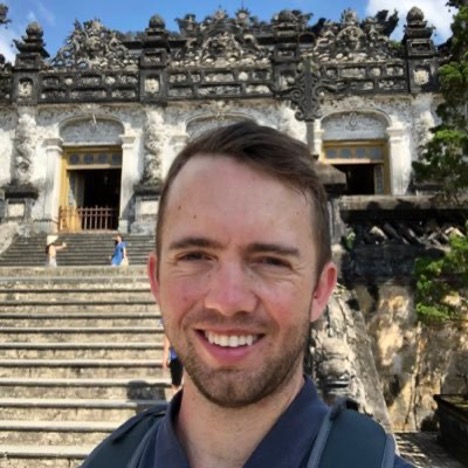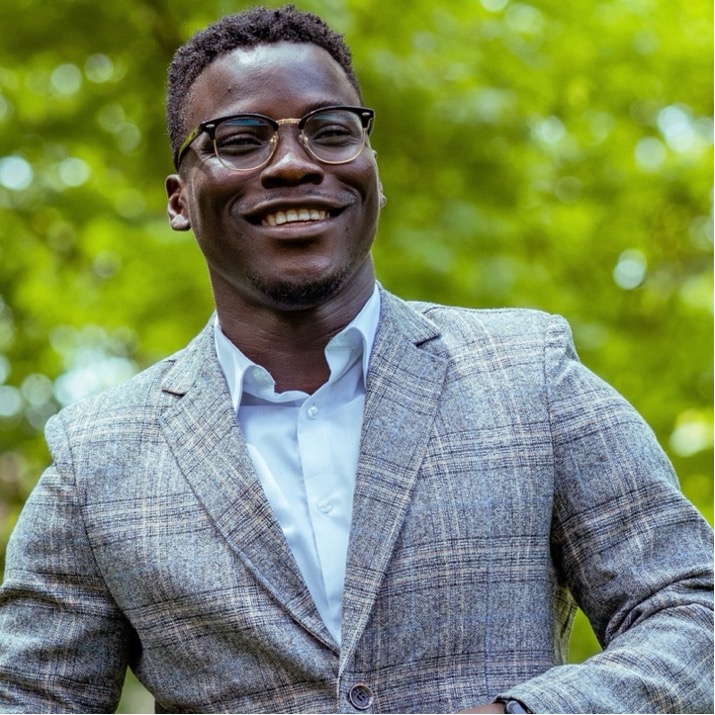

Five graduate students are the 2024–25 recipients of the Contemporary History Institute's Klinder Fellowships and the Baker Peace Fellowships.
All five are Ph.D. candidates, which means they have completed all the required coursework and have successfully passed their qualifying exams. The award provides fellows with a stipend to facilitate dissertation completion or research.
"Some students use these fellowships to visit archives or libraries for further dissertation research. Other students use the funding to attend and present their research at academic conferences," said Dr. Alec Holcombe , associate professor of history and director of the Contemporary History Institute (CHI).
Harrison Fender and Sukyoung Hong are the 2024-25 Klinder Fellows. The Klinder endowment was established in the 1990s to fund a dissertation writing year for Ohio University doctoral students enrolled in the Contemporary History Institute Certificate program .
Cody Billock , George Ofori Atta , and Jordan Zdinak are the 2024–25 Baker fellows. The John and Elizabeth Baker Peace Endowment funds the Baker Peace Fellowship through the Baker Peace Studies program, which was created in the 1980s to support teaching, scholarship and conferences at Ohio University that promote the study of conflict and conflict resolution. The program offers at least one fellowship each year to a CHI certificate student.
About the Fellowship Awardees:
Cody Billock
Billock’s dissertation, titled “Huế & the Global Vietnamese Civil War, 1945-1975”, examines a thirty-year period when a violent Civil War consumed Vietnamese society. Based on archival research in Vietnamese, French, and American archives, his project employs Huế City in Central Vietnam as a case study to explore the fractured nature of Vietnamese politics.
“At this time, various Nationalist Parties battled not only with the Communist Party but with each other for control of Huế city,” said Billock, who studies Vietnamese history under the advisement of Holcombe. “Sectarian religious strife between Catholics and Buddhists further contributed to the unrest. This civil war was grafted onto the broader Cold War struggle between the Communist and Capitalist blocs, which further facilitated domestic political violence in Vietnam.”
Billock, who earned his Master of Arts in History from San Diego State in 2020, said that during his Fellowship year he plans to continue his research at the John F. Kennedy, Lyndon B. Johnson, and Gerald Ford Presidential Archives in the United States. He also also plans to visit the Thua Thien Provincial archive in Vietnam.
Harrison Fender
Fender’s dissertation, “The Maritime Strategy Ashore: Amphibious Operations, Intelligence, and the Security of NATO’s Littoral,” discusses the use of British and American amphibious operations along NATO’s Northern Flank during the final years of the Cold War. British and American amphibious forces had been vital in protecting Western interests during the first decades of the Cold War. But by the beginning of the 1970s, her argues, economic stagnation and a shift from global commitments had weakened British and American amphibious capabilities. British and American amphibious forces found a new role in NATO planning, particularly defending NATO’s flanks. Intelligence assessments revealed NATO’s flanks had become vulnerable to Soviet naval, amphibious, and airborne forces. Overall, the use of amphibious forces in offensive and defensive roles helped demonstrate NATO’s resolve in checking Soviet ambitions in Europe.
“I plan on using the Klinder Fellowship to finish my dissertation,” Fender said. :I have recently concluded collecting all my research from British and American archives, and I will spend the next academic year writing my dissertation. My plan is to have the dissertation completed and defended by the Spring of 2025.”
Fender earned a Master of Arts in History from Ohio University in 2019. He studies British imperial and naval history under the direction of Dr. John Brobst .
Sukyoung Hong
Hong’s dissertation, “Seeing Through Western Eyes: How Racialized Beauty Standards Shaped Lives of Women of Color in the Late Twentieth Century,” explores how beauty standards, established around whiteness, contributed to the exclusion of Asian American women from mainstream American society and how Asian American women appropriated the white beauty ideals to pursue social acceptance in the late twentieth century.
Throughout U.S. history, whiteness was synonymous with Americanness, and the physical characteristics of Asian descendants were often classified as ugly. Hence, the slanted eyes of Asian Americans were targeted as the marker of their allegedly inferior race, and plastic surgeons promoted blepharoplasty as a solution for Asian Americans to erase their racial traits and create more beautiful, Americanized faces. Despite plastic surgeons’ racist rhetoric, Asian American women adopted white American beauty standards as a part of their strategy to prove conformity.
“Throughout the history of Asian American immigration, they were treated as unassimilable aliens who refused to be integrated into the mainstream society,” Hong said. “Additionally, because of a series of armed conflicts between the U.S. and East Asian nations, including the Pacific War during World War II, the Korean War, and the Vietnam War, Asian Americans were put under suspicion. Thus, their bodily manipulation through blepharoplasty was a tool to demonstrate their willingness for assimilation, prove their loyalty, and display their benignity.”
Hong earned an Master of Arts in History from Ewha Womans University in Seoul, South Korea in 2017. She is currently studying American women’s history with Dr. Katherine Jellison .
George Ofori Atta
Ofori-Atta’s dissertation – “Modernization, the State, and Disaster in Contemporary Ghana: An Environmental History of Accra c.1860 to the Present” – seeks to examine the devastations caused by flood disasters in 20th century Ghana with a focus on the urban settlements of Accra inhabited mostly by the Ga speaking people. His work lies at the intersection between environmental and social history.
“I argue that from the nineteenth century until the late twentieth century, the persistence of ideas about modernization and urbanization reshaped the understanding of environmental disaster among the Ga people of Accra,” Ofori-Atta said. “The relocation of Ghana’s capital from Cape Coast to Accra in 1877 created diverse forms of social organization and regulations that redefined local understandings of the landscape and environmental disasters. In the decades following Ghana’s independence, new political leaders embraced modernization theories of development without any consideration of indigenous thoughts and settlements located in the fragile environments where the poor lived.”
Ofori-Atta earned a Master of Arts in International Studies from Ohio University's Center for International Studies in 2021. He is currently studying African environmental history with Dr. Assan Sarr . During the Fellowship year, he to conduct field and archival research to enrich the study and outline all the chapters for his dissertation.
Jordan Zdinak
Zdinak’s dissertation – “Violence and Memory: Lynching in the Midwestern United States” – examines the historical trajectory of the normalization of violence against Black bodies during the era of slavery, how society tolerated lynching from the 1870s to the 1950s, then discouraged these extrajudicial murders, and now works to memorialize lynching victims. To show society’s shifting views, she focuses on themes such as the changing concepts of Black and white masculinity and femininity, the failure of law enforcement, the restructuring of public narratives about the Black family, and the roles of the media. Her project will contain an international component by explaining how racist ideas formed throughout the Atlantic world, how British colonists brought these notions to the U.S., and how these beliefs migrated to the Midwestern region after emancipation.
“Midwestern racial violence is worth investigating because it is an understudied topic, as most of the historiography focuses on the South and ignores how powerful and widespread ideas of white supremacy were across the United States,” said Zdinak, who also works under the advisement of Jellison. Refuting this misconception is a point she addresses in the dissertation by focusing specifically on case studies of lynching victims that communities have chosen to commemorate in the Midwestern U.S, while also advancing the idea that addressing past wrongs will enable discussions about present issues of violence perpetrated against Black bodies.
“The Baker Fellowship will allow me the time and opportunity to analyze these documents and swiftly write my dissertation,” said Zdinak, who earned her Master of Arts in History from Ohio University in 2020. “I also plan to travel to the Midwestern lynching commemoration sites to familiarize myself with the area’s history and to learn more about the historical marker projects and those who were involved in memorializing these lynching victims.”





